外研版高中英语选修9讲义Module 5 Section 2 Language Points
外研版高中英语选修9全册优质课件

+关系代词构成的学到很多东西的那位老
师。 This is the teacher from whom we've learned a lot.
课前自主学习
课堂互动探究
3.It is clear that Higgins treats women as objects. [信息提取] it作形式主语,来代替由that引导的主语从句。 [例句仿写] 据报道,那次交通事故中有3人丧命。
外研版高中选修9
英语
全册精品课件
课前自主学习 课堂互动探究
Bernard Shaw’s Pygmalion
课前自主学习
课堂互动探究
Ⅰ.单词识记
1.________ refined adj.举止文雅的,有教养的 2.___________ adj.迷人的,有魅力的,娇媚的 3.________________adj. 专横的,盛气凌人的
charming
domineering 4.________ v. 反抗,反叛
5.________ rebell vt.创造 n. ________
create
creation
drama 6.________ n. 戏剧 dramatist ________ n. 剧作家 dramatic ________adj.戏剧的 7.independent adj. ____________________ 独立的;单独的 大使;代表;使节 8.ambassador n. _______________________
外研选修9-课件-M5P4 Listening
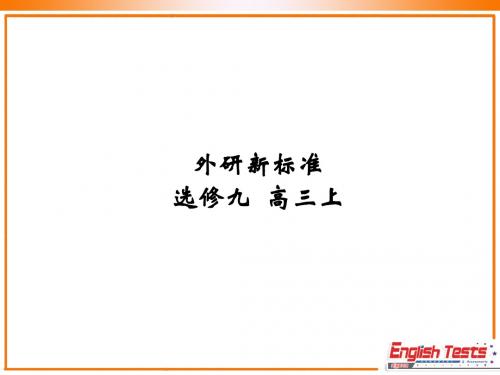
was sent to _j_o_i_n__ other Sioux at a reservation in North Dakota. In _1_8_8_5__, Sitting Bull joined Buffalo Bill’s Wild West Show and travelled throughout the United States and Canada. Some _b_e_l_ie_v_e_ he was allowed to join the show to __k_e_e_p_ _h_im__ _a_w__a_y_ from the reservation. When Sitting Bull returned to the reservation in __1_8_8_9_, many Native
He was also generous and wise, virtues _a_d_m__ir_e_d__ by his tribe. Sitting Bull became a _le_a_d_e_r_ of the Strong Heart warrior society, and he successfully increased Sioux hunting _g_r_o_u_n_d_s__. However the US army continually invaded this territory. From _1_8_6_3 to _1_8_6_8, the Sioux fought the army’s _p_r_es_e_n_c_e_ on their land. In approximately 1867, Sitting Bull became
The government threatened the Sioux with an order to __r_e_t_u_r_n__ to their reservations. The demand was resisted by the Sioux and in March, General George Crook __s_e_t _u_p__ a camp to attack the natives. Sitting Bull and the Sioux realised they could not _d_e_f_ea_t_ _t_h_e_ _a_r_m_y__ alone. They were _j_o_in_e_d__ by the Cheyenne and
高二英语外研版选修9教案:Module 2 TheFifthPeriod
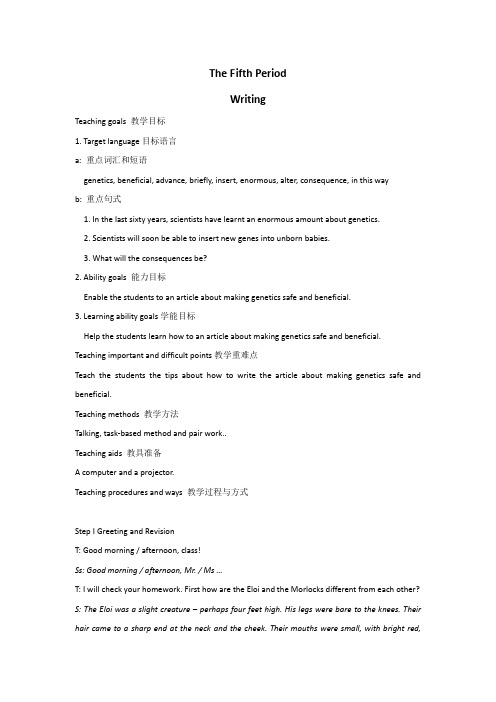
The Fifth PeriodWritingTeaching goals 教学目标1. Target language目标语言a: 重点词汇和短语genetics, beneficial, advance, briefly, insert, enormous, alter, consequence, in this wayb: 重点句式1. In the last sixty years, scientists have learnt an enormous amount about genetics.2. Scientists will soon be able to insert new genes into unborn babies.3. What will the consequences be?2. Ability goals 能力目标Enable the students to an article about making genetics safe and beneficial.3. Learning ability goals学能目标Help the students learn how to an article about making genetics safe and beneficial. Teaching important and difficult points教学重难点Teach the students the tips about how to write the article about making genetics safe and beneficial.Teaching methods 教学方法Talking, task-based method and pair work..Teaching aids 教具准备A computer and a projector.Teaching procedures and ways 教学过程与方式Step I Greeting and RevisionT: Good morning / afternoon, class!Ss: Good morning / afternoon, Mr. / Ms …T: I will check your homework. First how are the Eloi and the Morlocks different from each other? S: The Eloi was a slight creature – perhaps four feet high. His legs were bare to the knees. Their hair came to a sharp end at the neck and the cheek. Their mouths were small, with bright red,rather thin lips. Their eyes were large and mild. However, the Morlocks was a queer little ape-like figure. It was a dull white and had strange, large grayish-red eyes. Also there was flaxen hair on its head and down its back.T: Well done, thank you. You gave a detailed description of the Eloi and the Morlocks.Step II Pre-writingT: In this module, we have read some reading passages about genes. Now read them again. While reading, you should choose three advances in genetics that you think create or will create problems. Then you will work in pairs and have a discussion about what the problems are and what can be done to solve them. You are given 10 minutes to do it.T: Who can tell us the three advances in genetics that you think create or will create problems. Volunteer?S1: Story B in the text DNA – the Secret of Life tells us the genetic engineering can help the rich couples have a highly intelligent, good-looking baby. In the near future, we can have such a social phenomenon, the richer the family is, the more intelligent their children are. At that time, we will have a polarized (两极分化的) society.S2: Story C in the text DNA – the Secret of Life tells us the advance in genetics can insert an animal gene into an athlete, which makes him to be a world champion. As a matter of fact, it is a kind of cheating behavior.S3: Story D in the text DNA – the Secret of Life tells us the DNA tests can now detect inherited illnesses before the child is born. If all the parents whose babies are not healthy will get rid of the unborn babies, they are cruel and not humanistic. At the same time, the babies will lose their rights to live in the world owing to their brutal parents.T: I quite agree with you. Since the problems exist. But what can we do to solve them? Now please have a discussion to find out the solutions to solve the problems. You are given 4 minutes to do it.4 minutes later.T: Time is up. Who would like to explain your solutions to us? Volunteer?S: The rapid development of science is inevitable(必然的), although there are some side effect at the same time. We should not deny the new technology just because of the disadvantages itbrings to us. We cannot prevent the advancement of the society. Some reasonable laws can help us get rid of the side effect. The people who disobey the laws will be put into prison.T: A good idea!Step III WritingT: We will write an article about making genetics safe and beneficial. Just now you have listed the problems that the advances in genetics create and will create. Luckily, you have also found the solutions to solve the problems. How can we write a good composition about making genetics safe and beneficial? Please have a discussion about how to write the article and what you should pay more attention to.S: The theme of the article is how to make genetics safe and beneficial. So the emphases should be put on the solutions to make genetics safe and beneficial.S: First we should introduce the subject of genetics. For example, in the last 60 years, scientists have learnt an enormous amount about genetics.S: Second we should give a brief description about the three advances the genetics brings.S: Third the problems connected with theses advances should be described.S: The most important thing is to write what we can and should do to solve these problems.T: You did a good job! Now let’s write the article according to the suggestion you mentioned above.A sample version:In the last sixty years, scientists have learnt an enormous amount about genetics, which benefits our human beings greatly. As is know to us all, every coin has two sides. The genetics engineering has its advantages as well as disadvantages. So we should analyze the impact of genetics pro and con.Firstly, the genetics engineering brings a lot of benefits. For example, GM food can solve the famine in the world. DNA testing can help in criminal investigations, the genetics engineering can help create a “designer baby”, and DNA test can now detect inherited illnesses before the child is born.Meanwhile, genetics engineering creates some big problems connected with these advances. For instance, People whose genes predict illness may not get job or insurance cover. Owing to thecurrent absence of reliable data on genetic, there exist potential risks when people eat GM food. So, what should we do to solve these problems? We should carefully consider and respond to the challenges and opportunities that arise from scientific advances in human genetics. The authorities should pass a law that is fair, reasonable, and consistent with existing discrimination statutes. We will all gain much from the continuing advances in genetic science. But those advances should never come at the cost of basic fairness and equality under law.Step IV HomeworkWrite a passage according to article on page 102.。
2021年高中英语外研选修9学案unit5-核心要点回扣
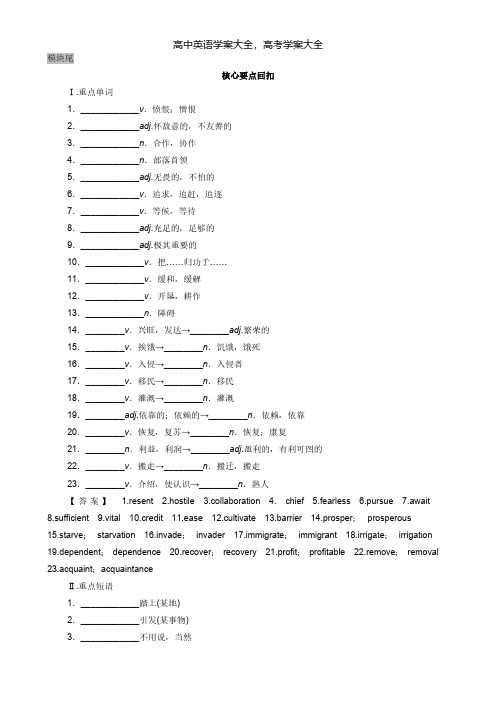
模块尾核心要点回扣Ⅰ.重点单词1.____________v.愤恨;憎恨 2.____________adj.怀敌意的,不友善的3.____________n.合作,协作4.____________n.部落首领5.____________adj.无畏的,不怕的6.____________v.追求,追赶,追逐7.____________v.等候,等待8.____________adj.充足的,足够的9.____________adj.极其重要的10.____________v.把……归功于……11.____________v.缓和,缓解12.____________v.开垦,耕作13.____________n.障碍14.________v.兴旺,发达→________adj.繁荣的15.________v.挨饿→________n.饥饿,饿死16.________v.入侵→________n.入侵者17.________v.移民→________n.移民18.________v.灌溉→________n.灌溉19.________adj.依靠的;依赖的→________n.依赖,依靠20.________v.恢复,复苏→________n.恢复;康复21.________n.利益,利润→________adj.盈利的,有利可图的22.________v.搬走→________n.搬迁,搬走23.________v.介绍,使认识→________n.熟人【答案】 1.resent 2.hostile 3.collaboration 4.chief 5.fearless 6.pursue 7.await 8.sufficient 9.vital 10.credit 11.ease 12.cultivate 13.barrier 14.prosper;prosperous 15.starve;starvation 16.invade;invader 17.immigrate;immigrant 18.irrigate;irrigation 19.dependent;dependence 20.recover;recovery 21.profit;profitable 22.remove;removal 23.acquaint;acquaintanceⅡ.重点短语1.____________踏上(某地)2.____________引发(某事物)3.____________不用说,当然4.____________另一方面5.____________结果;后来;转而;反过来6.____________和解7.____________签署和平协议8.____________in charge of9.____________word for word10.____________be acquainted with11.____________consist of12.____________of the most part13.____________sort out14.____________strike it rich用上面词组的适当形式填空15.I tell him never to____________my house again.16.Smoking can____________lung cancer.17.Soon you will____________the people around here.18.Water is said to____________oxygen and hydrogen.19.One of my friends went looking for gold in California and____________.【答案】 1.set foot on 2.lead to 3.needless to say 4.on the other hand 5.in turn 6.make peace (with sb.) 7.sign the peace treaty 8.负责;主管 9.逐字的 10.对……了解 11.包括 12.大部分 13.整理 14.暴富,发达 15.set foot in 16.lead to 17.be acquainted with 18.consist of 19.struck it richⅢ.重点句式1.Native Americans are_believed_to have come to North America from northeast Asia, arriving over a land bridge between Siberia and Alaska about 12,000 years ago.【句式仿写】 据信这些生物来自外太空。
高二英语外研版选修9教案:Module 5 TheFourthPeriod

The Fourth PeriodReading (II)Teaching goals 教学目标1. Target language 目标语言a. 重点单词和短语admiral, junk, immigrant, pursue, elusive, sufficient, vital, credit, ease, tension, ailing, recover, transcontinental, stretch, blast, untapped, spur, territory, cultivate, profitable, riot, enact, exclusion, repeal, barrier, initiate, for the most part, consist of, in search of, with hopes of, in addition to, in particular, credit one with…, take up, result in, due tob. 重点句子1. But in Europe it is believed that the first person to use the Cape of Good Hope as a sea route was Portuguese explorer Vasco da Gama, when he sailed from Europe to the East in 1497.2. These workers were good at using the gunpowder that was used to blast through the mountains and they created a vast network of track that opened up untapped resources not only in California but the northwest as well.3. Chinese immigrants may have been targeted due to the increasing belief that immigrants were occupying too many jobs in a city.Ability goals 能力目标Enable students to le arn about the Chinese Americans’ great contributions to the development of America and something about Zheng He.Learning ability goals 学能目标Help students realize the i mportance of the Chinese Americans’ great contributions to the development of America and learn something about Zheng He.Teaching important and difficult points教学重难点How to understand the history of the Chinese Americans well.Teaching methods 教学方法Discussing, fast reading and careful reading.Teaching aids 教具准备A tape recorder, a projector and a computer.Teaching procedures & ways 教学过程与方式Step I Revision and lead-inFirst check the answers to Activities 1 –3 on Page 115 and then arouse students’ interest in the Chinese Americans.T: Have you heard of Yang Zhenning, Li Zhengdao and Ding Zhaozhong?S: I heard of Yang Zhenning and Li Zhengdao.T: Would you like to tell us something about them?S:Yang was born on Sept. 22, 1922, in Hefei, Anhui Province in eastern China. He went to the United States and entered the University of Chicago in January 1946. After receiving his Ph.D. degree in 1948, Yang served for a year at the University of Chicago as an instructor and became a professor in 1955. Yang has worked on various subjects in physics, but has his chief interest in two fields: statistical mechanics and symmetry principles. While Li Zhengdao was born on November 24, 1926 in Shanghai, China. He went to the University of Chicago in 1946 and completed his PhD. Later, Li became the university's youngest full professor at Columbia University. He did work on high energy particle physics, symmetry principles, and statistical mechanics. What’s the most important thing is that In 1957,Yang Zhenning and Li Zhengdao won the Nobel Prize in Physics jointly for their penetrating investigation of the so-called parity laws, which has led to important discoveries regarding the elementary particles.” Yang and Li were the first Chinese Nobel Prize winners. They are both Chinese-American phycists.T: Thank you! How much you know about them! Who knows something about Ding Zhaozhong? Any volunteer?S: Let me try. On January 27, 1936, Ding Zhaozhong was brought back to China by his parents when he was three months old. He moved to Taiwan with his parents in 1949. He once worked in the Nuclear Center in Europe for one year, and began teaching at Columbia University since 1964 and became professor at the Massachusetts Institute of Technology in 1967. He is a world-famous physicist, leading hundreds of scientists from different countries, to work on an important experiment to explore the universe’s origin. He is the first Nobel Prize winner to deliver a speech in Chinese at the award ceremony. It is Professor Ding Zhaozhong, the famous Chinese-Americanphysicist.T: Another learned student. What great Chinese Americans! We should be proud of them.Today many Chinese Americans have played an important role not only in the development of America, but also in the development of the whole world. In fact the early Chinese Americans also made great contributions to the development of America, especially during the very foundation of the country. Today let’s learn about the history of the Chinese Americans.Step II Reading (Page 66)Ask students to read the passage and realize the importance of the Chinese Americans’ great contributions to the development of America.Pre-readingT: Some of you know much about today’s Chinese Americans. But how much do you know about the history of Chinese Americans? Now I’ll give you a quiz. Please work in pairs and try to answer the questions on the screen.Show the questions in Activity 1 on Page 66 on the screen.After a few minutes ask five of the students to report their discussion.T: Who’d like to answer the first question?S: We both think that probably in the middle of the 19th century, that’s to say, in the California Gold Rush, Chinese workers first went to the USA.T: That sounds reasonable. Next one?S: Both of us think that they mainly went to the West and South in the country. And California is one of the places.T: Good. What about the third question?S: At first, drawn by news of the California Gold Rush, they arrived in America with the purpose of make a big fortune. However, most of them didn’t realize their dreams.T: OK. Then what jobs did they do?S: Some of them worked in wool mills and shoe and clothing manufacturers and were the employees. But some immigrants even started their own factories and acted as the employers.Besides, some of them worked in the fields of mining, land development and irrigation or helped to build the Transcontinental Railroad.T: The last one?S: Many Chinese Americans still live in America.T: You all did a good job. Is what you said correct or not? Now please read the passage on Page 66 quickly and check your answers to the questions.While-readingT: Read the passage again and try to make notes about the main idea and complete the table in Activity 4.After a few minutes, check students’ understanding of the pass age.T: How many parts do you think the passage can be divided into and what does each part tell us? S: Four parts, in my opinion. Part 1, that is to say, the first paragraph, tells us why several waves of Chinese immigrants arrived in America. Part 2 includes the passages from Para. 2 to Para. 5, which tells us what the Chinese immigrants did when they really arrived there,and also their great contributions to the development of America. Part 3 referring to Para. 8 is about the wrong treatment of Chinese immigrants. And Part 4, the last paragraph, mainly tells us that Chinese immigrants continued to work in America as in the past.T: Who can sum up the main idea of the passage?S: The passage is written according to the timeline. So it tells us the history of the Chinese Americans, especially the Chinese Americans’ contributions to the very foundations of the USA and shows good relations between Chinese and America from the very beginning.T: Very good.Suggested answers to Activity 4:Get students to read the passage again and finish Activities 5 and 6. After a few minutes, check the answers with the whole classPost-readingT: Since you have got the general idea of the passage, now work in pairs and discuss your answers to the questions in Activity 7.Go around the students and give them a hand if necessary. After a few minutes, check their answers.Suggested answers to Activity 7:1 I feel that the contribution the Chinese have made to the USA is very great. It was theChinese Americans that took up the labor shortage, supplied the agricultural knowledge and helped build the railroads, especially during the foundations of the country.2 In the 19th century, Chinese immigrants were once targeted due to the increasing belief thatimmigrants were occupying too many jobs in a city for a time. And in 1882, Congress passed the Chinese Exclusion Act which prevented Chinese without family already in the US from entering the country.I think this happens in other countries today.3 In my opinion, Chinese people should be discouraged from working abroad. There are two reasons. Firstly, different countries have different customs and cultures, and different languages are spoken there. Chinese people may not be accustomed to these. And they will meet a lot of inconvenience. Secondly, The Chinese government has implemented the policy of supporting scholars to study abroad and bringing home advanced technology, academy, ideas…These people should come back and play their due role in our country.4 I think the Chinese can make contributions to world peace and human progress in countries likethe USA in the 21st century.The west can learn culture-moral superiority from China.5 I have ever met a Chinese person who has lived in the USA. Her way of life and belief about life are different from me.ExplanationT: Now I’ll pla y the tape twice for you. Please make a mark where you have difficulties while listening.After students finishing listening, deal with the following points first and then the students questions.Show the following points on the screen.for the most part, consist of, in search of, with hopes of, in addition to, in particular, credit one with…, take up, result in, due toThese workers were good at using the gunpowder that was used to blast through the mountains and they created a vast network of track that opened up untapped resources not only in California but the northwest as well.Chinese immigrants may have been targeted due to the increasing belief that immigrants were occupying too many jobs in a city.T: Do you have any problems?S: I don’t know whethe r the word “that”can be replaced by “which” or be left out in the sentence “Chinese immigrants may have been targeted due to the increasing belief that immigrants were occupying too many jobs in a city.”T: Good question. Here the clause introduced by “that” is an appositive clause, which is used to explain the concrete content of the noun “belief” before it. Though “that” has no me aning and can’t act as any member in the clause, it can’t be left out and replaced by “which”.T: Do you still have anything you can’t understand?Ss: No.Step III Reading (Page 64)Get students to read and learn more about Zheng He.Lead-inT: By now we’v e talked much about the Chinese Americans. So we know the two countries connected with each other since the early time. I think you must hear of Zheng He, right? …Who can tell us something about him?S: Zheng He once led a fleet of many ships to make seven far-ranging voyages. Passing the Southeast Asian countries, the Indian Ocean, Persian Gulf and Maldives Islands, Zheng He explored as far as Somalia and Kenya on the eastern coast of Africa. These were the largest-scale and longest voyages in the world before the age of Columbus. These seven voyages, unprecedented in size, organization, navigational technology, and range, demonstrated not only the power and wealth of the Ming Dynasty, but also Zheng He’s extraordinary command ability.T: You have a good knowledge of history. Was he the first foreigner to visit the Americas?Any volunteer?S: Yes. I think so.S: But I don’t think so. There are no historical records, so our history textbooks don’t tell us this point.T: I think you must wa nt to know more about this. Now let’s read the passage on Page 64, which can help us to get something related to the question.Fast readingAsk students to look through the passage and find the names of a writer, a leader of a country, a Chinese sailor and a European explorer. After 2 minutes, check the answers with the whole class. Suggested answers to Activity 2:1 a writer: Gavin Menzies2 a leader of a country: Zhu Di3 a Chinese sailor: Zheng He4 a European explorer: Vasco da GamaCareful readingT: This time read the passage carefully, and then work in pairs to find some detailed information according to the requirement of Activities 3 and 4.Suggested answers to Activity 3:1 When Menzies was researching his book in Venice, Italy, he was shown a map dated 1459,which included southern Africa and the Cape of Good Hope. On the map was a note about a voyage from east to west round the Cape in 1420 and a picture of a Chinese junk.2 The fact would imply that the first person to use the Cape of Good Hope was not a Chinese.3 The reason for the lack of historical record to prove it is probably that records of the voyages were destroyed by an official called Liu Daxia, who opposed the voyages and burned the reports that Zheng wrote for the emperor.4 From the passag e we know that a professor at Wuhan University, has his doubts. “If Zheng He really went to America, why are there no historical records?” he asked. And in Europe it is believed that the first person to use the Cape of Good Hope as a sea route was Portuguese explorer Vasco da Gama, when he sailed from Europe to the East in 1497. So some people doubted Zheng He’s voyage.5 Menzies said “Nobo dy has ever explained why 15th century European explorers had maps. Who drew the maps? There are millions of square miles of ocean. The Chinese had the biggest ships in the world. If they didn’t draw the maps, who did? ” Menzies impli ed that the Chinese must have drawn the first maps by saying these words.Suggested answers to Activity 4:1 “junk”, “vessel” and “ship”.2 “foreigner.”3 “may” and “probably”.Step IV Reading and speaking( Page 117)Ask students to read the passage on Page 117 and try to finish Activities 7 – 9 in Workbook.T: Have you heard of American’s first international celebrity? She was Pocahontas, the “Indian princess”. It was she that encouraged emigration from Britain to Virginia. I think you m ust want to learn about what happened. Now let’s read “The Story of Pocahontas” on Page 117 and try to finish the activities.Suggested answers:Activity 8:1 Ten percent of the population of Jamestown survived.2 She was eighteen.3 Because she was held hostage by the English settlers and while she was held hostage, she metand married an Englishman called John Rolfe. As a result, she went to England.4 Yes, it was.5 In England.6 Edith Wilson, the wife of Woodrow Wilson, who was president of the United States from 1913 to 1921.Activity 9:1 In my opinion, the Algonquians didn’t want the white settlers to live on their land. Theywanted the white people to leave the area.2 Before Pocahontas came to England, British people were worried about stories of danger, violence and kidnappings. But after she visited England and lived London for a year, meeting the King of England, people in England changed their minds.3 I think the story of Pocahontas saving the life of John Smith is true.Step V Summary and homeworkT: Today we have mainly read two texts on Pages 64 and 66. What can you learn from the two texts?S: By reading them, we know how great the Chinese people are. They are knowledgeable and helpful, which can be seen from the great contributions that the Chinese Americans made to the development of the USA, especially during the very foundation of the country.S: We also know that Zheng He, the Chinese navigator, may have been the first foreigner to visit the Americas and most of the renowned European explorers actually sailed with maps charted by the Chinese according to Gavin Menzies. We should be proud of Zheng He and all our Chinese people.T: Good. After class please finish Activity 1on Page 64 and Activity 2 on Page 66.。
2018-2019新课堂高中英语(外研版)选修九讲义:Module 5 Period Two Word版含答案
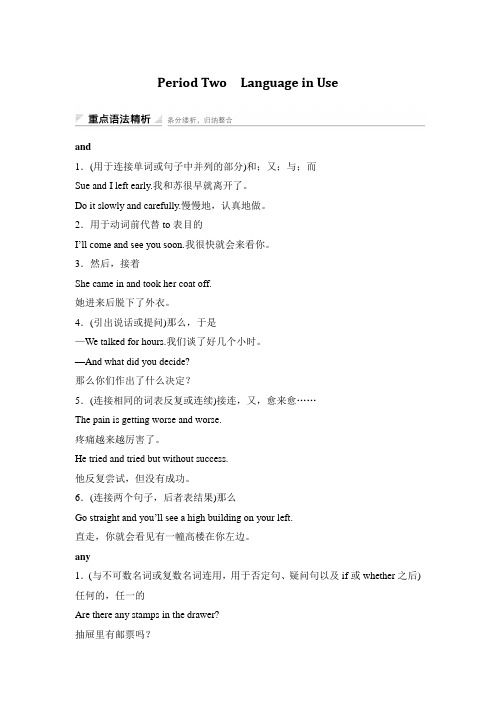
Period Two Language in Useand1.(用于连接单词或句子中并列的部分)和;又;与;而Sue and I left early.我和苏很早就离开了。
Do it slowly and carefully.慢慢地,认真地做。
2.用于动词前代替to表目的I’ll come and see you soon.我很快就会来看你。
3.然后,接着She came in and took her coat off.她进来后脱下了外衣。
4.(引出说话或提问)那么,于是—We talked for hours.我们谈了好几个小时。
—And what did you decide?那么你们作出了什么决定?5.(连接相同的词表反复或连续)接连,又,愈来愈……The pain is getting worse and worse.疼痛越来越厉害了。
He tried and tried but without success.他反复尝试,但没有成功。
6.(连接两个句子,后者表结果)那么Go straight and you’ll see a high building on your left.直走,你就会看见有一幢高楼在你左边。
any1.(与不可数名词或复数名词连用,用于否定句、疑问句以及if或whether之后)任何的,任一的Are there any stamps in the drawer?抽屉里有邮票吗?You can’t go out without any shoes.你不能不穿鞋就出门。
2.(与单数可数名词连用)任一Take any book you like.喜欢哪本你就拿哪本。
3.代词(用于否定句、疑问句或if,whether之后)任何数量Please tell me how many people are coming, if any.请告诉我,如果有人要来的话,有多少。
4.(代词)任一,任何一些—Which colour do you want?你要哪种颜色?—Any of them will do.随便哪种都行。
外研版英语选修9讲义:unit 2-核心要点回扣

模块尾核心要点回扣Ⅰ.重点单词1.________v t.审问;盘问;询问2.________v.改变;使变样3.________n.结果;影响4.________adj.(生物学中)遗传的;世袭的5.________v t.更改;改正6.________n.标签7.________v.转移8.________v.发布9.________v.想象10.________adj.怪异的11.________v.开始明白;开始理解12.________v.区分;区别13.________v.战栗;发抖14.________v.调查→________n.调查15.________n.保险→________v.为……投保16.________adj.管制的→________ n.规则17.________adj.不受影响的→________n.抵抗力18.________v.批准;认可→________n.批准;认可19.________v.反对→________n.反对20.________v t.检查→________n.检查21.________v.进化→________n.进化【答案】 1.question 2.alter 3.consequence4.hereditary 5.modify bel7.transfer8.issue9.fancy10.peculiar11.dawn12.differentiate13.shudder 14.investigate;investigation15.insurance;insure16.regulatory;regulation17.resistant;resistance18.approve;approval19.oppose;opposition20.inspect;inspection21.evolve;evolutionⅡ.重点短语1.____________(长相或举止)像(长辈)2.____________有(很大)影响3.____________除掉4.____________在另一方面5.____________传给(下一代)6.____________死于(内因)7.____________在很大程度上8.____________详细地9.____________come to an end10.____________laugh into my eyes11.____________be resistant to12.____________approve of13.____________place a ban on14.____________in favour of15.____________dawn on16.____________apply to【答案】 1.take after 2.have an (enormous) influence 3.get rid of 4.on the other hand 5.pass... on to 6.die of7.to a great extent8.in detail9.结束10.直视着我的眼睛笑11.不受影响的12.赞成;同意13.对……禁止14.支持15.明白16.适用于用上面词组的适当形式填空17.You are the leader, so____________,you are responsible for the delay.18.He described____________how the accident happened, and we all felt sorry for the victims.19.There were 16 votes____________my suggestion, and 15 against.20.I____________your trying to earn some money, but please don't neglect your。
外研版英语选修9课件:Unit 2-核心要点回扣
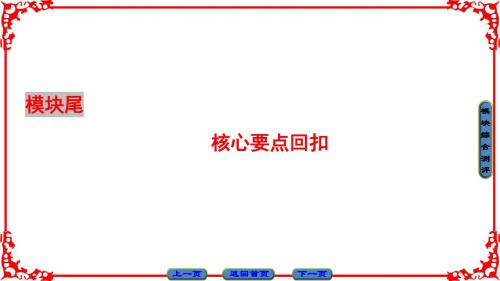
模 块 综 合 测 评
上一页
返回首页
ห้องสมุดไป่ตู้
下一页
Ⅰ.重点单词 1.________vt.审问;盘问;询问 2.________v.改变;使变样 3.________n.结果;影响 4.________adj.(生物学中)遗传的;世袭的 5.________vt.更改;改正 6.________n.标签 7.________v.转移 8.________v.发布
_______________________________________________________________ 3.As long as you have a good diet, scientists can predict your height by looking at your parents' heights.
8.in detail
11.不受影响的
13.对……禁止
14.支持
16.适用于
上一页
返回首页
下一页
用上面词组的适当形式填空
17.You are the leader, so____________, you are responsible for the delay. 18.He described____________how the accident happened, and we all felt sorry for the victims. 19.There were 16 votes____________my suggestion, and 15 against. 20.I____________your trying to earn some money, but please don't neglect your studies. 21.This law____________all places of public entertainment.
2019-2020同步外研英语选修九新突破讲义:Module 5 Section 2 Language Points
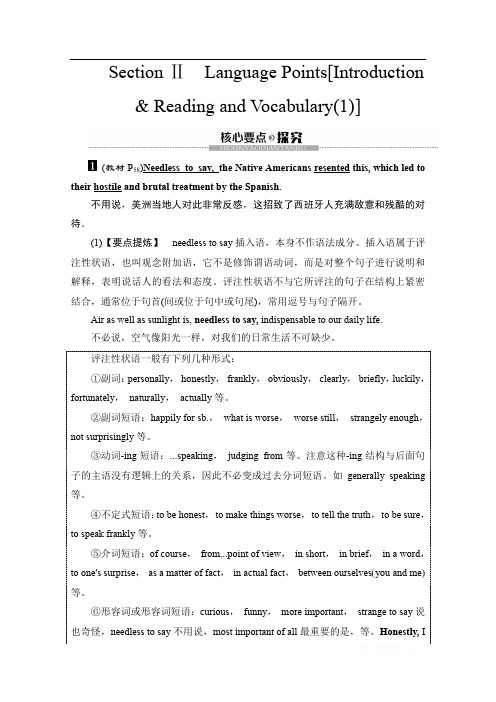
Section ⅡLanguage Points[Introduction & Reading and V ocabulary(1)](教材P58)Needless_to_say,_the Native Americans resented this, which led to their hostile and brutal treatment by the Spanish.不用说,美洲当地人对此非常反感,这招致了西班牙人充满敌意和残酷的对待。
(1)【要点提炼】needless to say插入语,本身不作语法成分。
插入语属于评注性状语,也叫观念附加语,它不是修饰谓语动词,而是对整个句子进行说明和解释,表明说话人的看法和态度。
评注性状语不与它所评注的句子在结构上紧密结合,通常位于句首(间或位于句中或句尾),常用逗号与句子隔开。
Air as well as sunlight is, needless to say, indispensable to our daily life.不必说,空气像阳光一样,对我们的日常生活不可缺少。
评注性状语一般有下列几种形式:①副词:personally,honestly,frankly,obviously,clearly,briefly,luckily,fortunately,naturally,actually等。
②副词短语:happily for sb.,what is worse,worse still,strangely enough,not surprisingly等。
③动词-ing短语:...speaking,judging from等。
注意这种-ing结构与后面句子的主语没有逻辑上的关系,因此不必变成过去分词短语。
如generally speaking 等。
④不定式短语:to be honest,to make things worse,to tell the truth,to be sure,to speak frankly等。
外研社高中英语选修九Module 5 备课参考
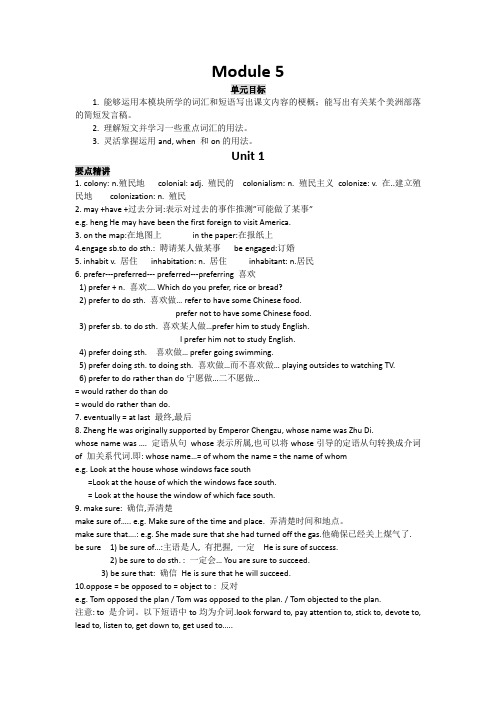
Module 5单元目标1. 能够运用本模块所学的词汇和短语写出课文内容的梗概;能写出有关某个美洲部落的简短发言稿。
2. 理解短文并学习一些重点词汇的用法。
3. 灵活掌握运用and, when 和on的用法。
Unit 1要点精讲1. colony: n.殖民地colonial: adj. 殖民的colonialism: n. 殖民主义colonize: v. 在..建立殖民地colonization: n. 殖民2. may +have +过去分词:表示对过去的事作推测”可能做了某事”e.g. heng He may have been the first foreign to visit America.3. on the map:在地图上in the paper:在报纸上4.engage sb.to do sth.: 聘请某人做某事be engaged:订婚5. inhabit v. 居住inhabitation: n. 居住inhabitant: n.居民6. prefer---preferred--- preferred---preferring 喜欢1) prefer + n. 喜欢…. Which do you prefer, rice or bread?2) prefer to do sth. 喜欢做… refer to have some Chinese food.prefer not to have some Chinese food.3) prefer sb. to do sth. 喜欢某人做…prefer him to study English.I prefer him not to study English.4) prefer doing sth. 喜欢做… prefer going swimming.5) prefer doing sth. to doing sth. 喜欢做…而不喜欢做… playing outsides to watching TV.6) prefer to do rather than do宁愿做…二不愿做…= would rather do than do= would do rather than do.7. eventually = at last 最终,最后8. Zheng He was originally supported by Emperor Chengzu, whose name was Zhu Di.whose name was …. 定语从句whose表示所属,也可以将whose引导的定语从句转换成介词of 加关系代词.即: whose name…= of whom the name = the name of whome.g. Look at the house whose windows face south=Look at the house of which the windows face south.= Look at the house the window of which face south.9. make sure: 确信,弄清楚make sure of….. e.g. Make sure of the time and place. 弄清楚时间和地点。
2019-2020新课堂英语选修九外研版讲义:Module 5 Period One Word版含答案

话题美文欣赏Santa Fe, the capital of New Mexico,U.S.A.,is in the central part of the state, on the Santa Fe River, which flows into the Rio Grande 35 kilometers west of the city.More than two thousand meters above sea level, it lies in the Sangre de Cristo Mountains with the Ortiz Mountains to the southeast.Santa Fe was founded in 1609 by the Spanish(西班牙人).In 1680,the Indians seized the place but only held it for twelve years before the Spanish retook it.The city remained under Spanish rule until Mexico won its independence(独立)in 1821.From then on,it was a Mexican city until 1846 when it was taken over by American troops. With a population of 48,953,Santa Fe is now the second largest city in the state.Because of its sunny weather, rich history and surrounding mountains, it is a good place for holiday makers.Besides hunting andskating in the mountains people enjoy shopping in the Indian and Spanish shops, which brings a large income to the city every year.In summer,there is an international opera(歌剧)season when operas are shown in a partly-roofed, open-air theatre daily for people from all over the world.Read the passage and choose the best answer.1.At present Santa Fe belongs to________.A.India B.MexicoC.Spain(西班牙) D.the United States2.Santa Fe was under the rule of the Mexicans in________.A.1675 B.1695C.1816 D.18333.The people who held Santa Fe for the longest period in history were the________.A.Spanish B.IndiansC.Mexicans D.Americans答案 1.D 2.D 3.APeriod One Introduction & Reading and Vocabulary(1)Ⅰ.单词识记1.________v.兴旺,发达→________adj.繁荣的;成功的→________n.兴旺,繁荣2.________v.愤恨,感到气愤→________adj.感到气愤的;憎恨的→________ad v.气愤地3.________adj.怀敌意的,不友善的→________n.敌意,对抗4.________adj.野蛮的,凶残的,残忍的→________n.残酷的人;暴君→________v.使变残忍5.________n.合作,协作→________v.合作,协作→________adj.合作的,协作的6.________n.饥饿,饿死→________v.(使)挨饿,饿死7.________n.入侵者→________v.入侵,侵占8.________adj.无畏的,不怕的→________adj.担心的;可怕的→________n.害怕,惧怕9.________n.家畜,牲畜10.________n.居留地→________v.保留,储备;预订,预约答案 1.prosper;prosperous;prosperity 2.resent;resentful;resentfully 3.hostile;hostility 4.brutal;brute;brutalize 5.collaboration;collaborate;collaborative 6.starvation;starve7.invader;invade8.fearless;fearful;fear9.livestock 10.reservation;reserveⅡ.短语天地1.set ________on踏上(某地);进入2.lead ________引发(某事物);导致3.________to say不用说,当然4.make________(with sb)和解5.________turn结果;后来;转而;反过来6.________the way顺便说一下7.________force用武力8.on the other________另一方面9.die________ 死于10.________ a treaty签协约答案 1.foot 2.to 3.needless 4.peace 5.in 6.by7.by8.hand9.of/from10.makeⅢ.句型搜索1.Needless__to__say,__the Native Americans resented this, which led to their hostile and brutal treatment by the Spanish.[信息提取]needless to say插入语,本身不作语法成分。
高二英语外研版选修9教案:Module2TheSixthPeriod含解析
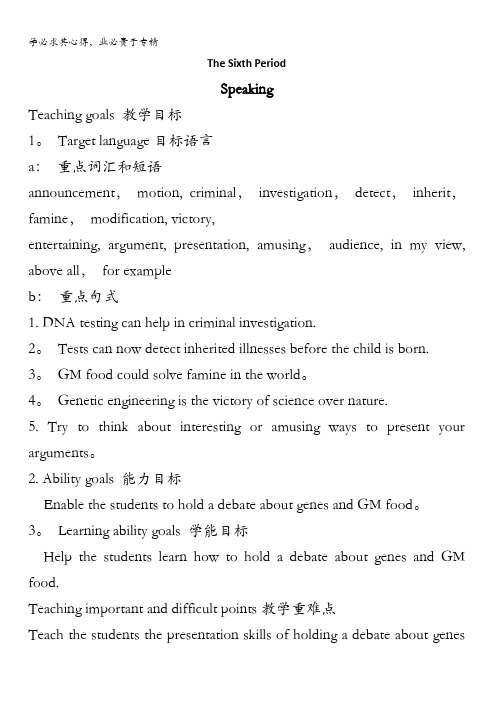
The Sixth PeriodSpeakingTeaching goals 教学目标1。
Target language目标语言a:重点词汇和短语announcement,motion, criminal,investigation,detect,inherit,famine,modification, victory,entertaining, argument, presentation, amusing,audience, in my view, above all,for exampleb:重点句式1. DNA testing can help in criminal investigation.2。
Tests can now detect inherited illnesses before the child is born.3。
GM food could solve famine in the world。
4。
Genetic engineering is the victory of science over nature.5. Try to think about interesting or amusing ways to present your arguments。
2. Ability goals 能力目标Enable the students to hold a debate about genes and GM food。
3。
Learning ability goals 学能目标Help the students learn how to hold a debate about genes and GM food.Teaching important and difficult points教学重难点Teach the students the presentation skills of holding a debate about genesand GM food。
2019-2020同步外研英语选修九新突破讲义:Module 1 Section 2 Language Points
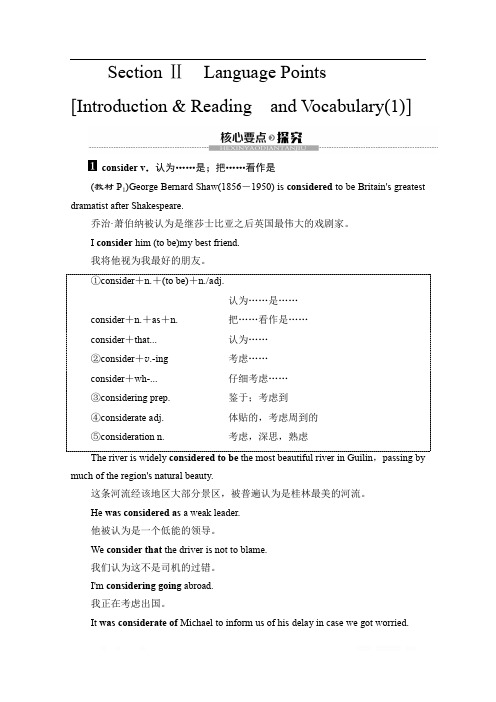
Section ⅡLanguage Points [Introduction & Reading and V ocabulary(1)]consider v.认为……是;把……看作是(教材P1)George Bernard Shaw(1856-1950) is considered to be Britain's greatest dramatist after Shakespeare.乔治·萧伯纳被认为是继莎士比亚之后英国最伟大的戏剧家。
I consider him (to be)my best friend.我将他视为我最好的朋友。
①consider+n.+(to be)+n./adj.认为……是……consider+n.+as+n. 把……看作是……consider+that... 认为……②consider+v.-ing 考虑……consider+wh-... 仔细考虑……③considering prep. 鉴于;考虑到④considerate adj. 体贴的,考虑周到的⑤consideration n. 考虑,深思,熟虑The river is widely considered to be the most beautiful river in Guilin,passing by much of the region's natural beauty.这条河流经该地区大部分景区,被普遍认为是桂林最美的河流。
He was considered as a weak leader.他被认为是一个低能的领导。
We consider that the driver is not to blame.我们认为这不是司机的过错。
I'm considering going abroad.我正在考虑出国。
It was considerate of Michael to inform us of his delay in case we got worried.迈克尔通知我们他的延误以防我们担心,他真是考虑周全。
2019-2020同步外研英语选修九新突破讲义:Module 6 Section 2 Language Points

Section ⅡLanguage Points [Introduction & Reading and V ocabulary(1)]revise v.修订;修改;复习功课(教材P72)They then spent another 18 years revising it!后来他们又花了18年修订它!The old rules have to be revised because they only applied to the circumstances that existed when they were made a hundred years ago.旧的规则不得不修改,因为它们只适用于一百年前制定它们时的情况。
The final exams are coming, and I have to start revising.期末考试即将来临,我得开始复习功课了。
在将报告打印出来之前,他做了一些小小的修改。
完成句子①我已改变了对他的看法。
I have________________of him.②他修改了他的故事,把它缩短了。
He________________to make it shorter.③我没有很多时间为考试复习。
I don't have much time to________________tests.【答案】①revised my opinion②revised his story ③revise forcontract n.合同,合约(教材P72)He signed a contract in June 1746 but the dictionary did not appear until1755.1746年6月他签署了一份合同,但直到1755年词典才得以出版。
These clauses form a part of the contract between the buyer and the seller.这些条款构成了买卖双方所签合同的一部分。
- 1、下载文档前请自行甄别文档内容的完整性,平台不提供额外的编辑、内容补充、找答案等附加服务。
- 2、"仅部分预览"的文档,不可在线预览部分如存在完整性等问题,可反馈申请退款(可完整预览的文档不适用该条件!)。
- 3、如文档侵犯您的权益,请联系客服反馈,我们会尽快为您处理(人工客服工作时间:9:00-18:30)。
Section ⅡLanguage Points[Introduction & Reading and V ocabulary(1)](教材P58)Needless_to_say,_the Native Americans resented this, which led to their hostile and brutal treatment by the Spanish.不用说,美洲当地人对此非常反感,这招致了西班牙人充满敌意和残酷的对待。
(1)【要点提炼】needless to say插入语,本身不作语法成分。
插入语属于评注性状语,也叫观念附加语,它不是修饰谓语动词,而是对整个句子进行说明和解释,表明说话人的看法和态度。
评注性状语不与它所评注的句子在结构上紧密结合,通常位于句首(间或位于句中或句尾),常用逗号与句子隔开。
Air as well as sunlight is, needless to say, indispensable to our daily life.不必说,空气像阳光一样,对我们的日常生活不可缺少。
评注性状语一般有下列几种形式:①副词:personally,honestly,frankly,obviously,clearly,briefly,luckily,fortunately,naturally,actually等。
②副词短语:happily for sb.,what is worse,worse still,strangely enough,not surprisingly等。
③动词-ing短语:...speaking,judging from等。
注意这种-ing结构与后面句子的主语没有逻辑上的关系,因此不必变成过去分词短语。
如generally speaking 等。
④不定式短语:to be honest,to make things worse,to tell the truth,to be sure,to speak frankly等。
⑤介词短语:of course,from...point of view,in short,in brief,in a word,to one's surprise,as a matter of fact,in actual fact,between ourselves(you and me)等。
⑥形容词或形容词短语:curious,funny,more important,strange to say说也奇怪,needless to say不用说,most important of all最重要的是,等。
Honestly, Ithink you are mistaken.说实话,我觉得你弄错了。
Obviously, nobody expected us to be here today.明显地没有人希望我们今天来。
Happily for him, his father's second wife was kind to him.使他幸福的是他的继母对他很好。
Judging from his looks, he is a rich nobleman.从外表看,他是一个富有的贵族。
To be sure, many people may disagree.肯定会有许多人不同意。
In a word, we must make careful preparations if we want to do our work well.总之,如果我们想把工作做好,就要预先做好充分准备。
One must wait until the soil is damp enough, and, more important, warm enough.一定要等到土壤有足够的湿度,更重要的是,有足够的温度。
完成句子①就我个人而言,我认为他不会采访你。
____________,I don't think he'll interview you.②更糟糕的是,这种酒根本不适合在宴会上喝。
____________,this wine was not at all suitable for drinking at a banquet.③说实话,我不喜欢你的发型。
____________,I don't like your hair style.④一般说来,男孩比女孩强壮。
____________,a boy is stronger than a girl.【答案】①Personally②What's worse/To make things worse③To be honest④Generally speaking(2)resent vt.怨恨;愤恨(后接名词、动词-ing形式)His father seems to resent my being here.我待在这里,他的父亲似乎不大高兴。
I resent your suspicions about my motive.你怀疑我的动机,我对此十分恼火。
I resent having to get his permission for everything I do.我讨厌做每件事都要得到他的许可。
完成句子⑤我必须说我对受到如此待遇感到非常气愤。
I must say I________________like that.⑥我恨(极)你的批评。
I (strongly / bitterly) ________________.【答案】⑤resent being treated⑥resent your remarks(3)hostile adj.怀敌意的;不友善的;恶意的I don't like her manner—she's very hostile.我不喜欢她的态度——待人如仇敌。
He was full of the hostile attitude to meet us.他遇见我们时充满了敌意。
be hostile to/towards 对……怀有敌意的;反对……的It's not polite to be openly hostile towards your teachers.公然对抗老师是不礼貌的。
He was hostile to any change in our plan.他反对我们计划中的任何改变。
完成句子⑦你应当考虑不利于植物生长的环境。
You should consider the__________for plants to grow in.⑧我不知道她为什么对我抱有敌意。
I don't know why she ________________me.【答案】⑦hostile condition⑧is hostile tomake peace (with sb.)和解;与……言归于好(教材P59)Eventually, the Apaches and the Pueblos made peace with each other, but the arrival of the Spanish changed everything.最后阿帕切人和普韦布洛人和解,但西班牙人的到来改变了一切。
She was trying to make peace with her next-door neighbors.她试图与隔壁邻居讲和。
in peace平静地;处于平静状态at peace 处于和平/平静状态at peace with 与……和睦相处peace and quiet 安静;宁静All the villagers live together in peace.所有村民都和睦相处。
Our country is at peace right now.我们的国家现在处于和平状态。
完成句子①他同父亲言归于好了。
He________________his father.②经过6年内战后,这个国家现在处于和平状态。
After six years of civil war, the country is now________________.③请让我安静地工作。
Please let me do my work____________.【答案】①made peace with②at peace ③in peacein turn结果;转而;反过来;依次,轮流地(教材P59)The Apaches, in turn, raided Spanish settlements and stole cattle, horses and weapons.反过来,阿帕切人袭击西班牙的驻地,盗走他们的牲口、马匹和武器。
In turn, this helps to prevent forced disclosures.反过来,这有助于防止强制泄漏。
Please come up in turn to collect your books.请依次过来取你们的书。
by turns轮流地;交替地take turns to do/in/at doing 依次;轮流Let's take turns at doing it.让我们轮流来做吧。
We did the work by turns.我们轮流干这活。
完成句子①他们轮流照顾他的妹妹。
They________________nursing his sister.②我们船上一共有12人,轮流划桨。
There were twelve of us in the boat and we rowed______________.③一般来说,增加生产会增加利润。
Generally speaking,increased production will,__________,lead to increased profits.④轮到你来擦窗户了。
____________to clean the windows.【答案】①took turns in/at②by turns③in turn ④It's your turn。
